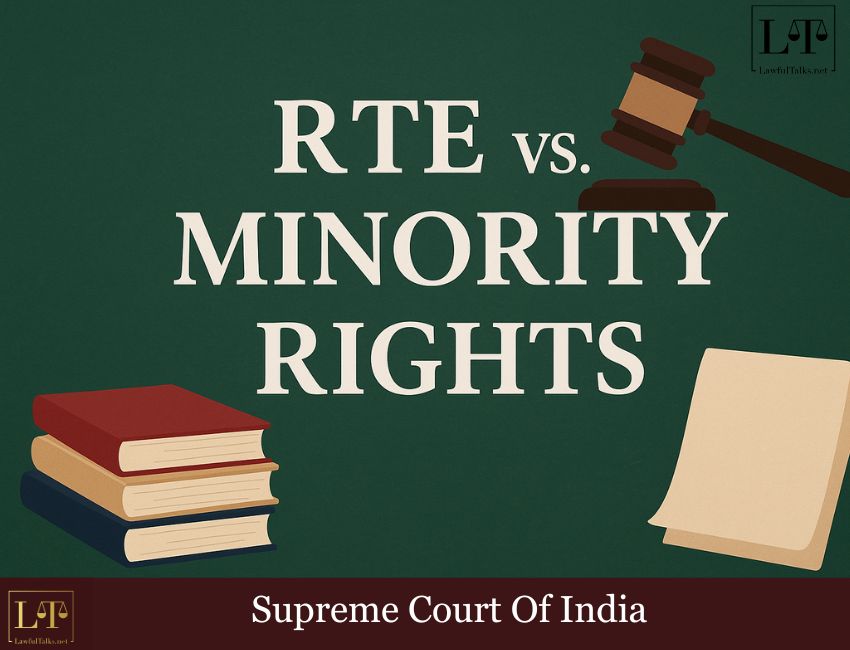Allahabad HC Sets Aside Afzal Ansari's Conviction, Allows Him to Continue as MP

The Supreme Court’s recent decision concerning the Right of Children to Free and Compulsory Education Act, 2009 (RTE Act) and its relationship with minority rights marks a significant development in the ongoing discourse. Delivered by a bench comprising Justice Dipankar Datta and Justice Manmohan, the ruling not only revisits long-standing disputes about teacher eligibility but also strikes at the heart of constitutional questions concerning Articles 21A and 30(1).

Revisiting the Pramati Judgment:
The central feature of the judgment is the Court’s candid expression of doubt over the correctness of the 2014 Pramati Educational & Cultural Trust ruling.
A five-judge Constitution Bench in the Pramati Educational & Cultural Trust had exempted minority schools—both aided and unaided—from the purview of the RTE Act. The present bench, however, was unequivocal in its stance that such a sweeping exemption is inconsistent with constitutional principles.
Justice Datta and Justice Manmohan observed:
“In our considered opinion, the RTE Act ought to apply to all minority institutions, whether aided or unaided. As discussed, its implementation does not erode—let alone annihilate—the minority character protected under Article 30(1). On the contrary, applying the RTE Act aligns with the purposive interpretation of Article 30(1), which was never meant to shield institutions from reasonable regulation in pursuit of constitutional goals. There is no inherent conflict between Article 21A and Article 30(1); both can and must co-exist mutually.”
The bench observed that Article 30(1) was never intended to provide blanket immunity from regulation and should instead, be read in conjunction with Article 21A, which guarantees every child the right to free and compulsory education.
Questions Referred to the Chief Justice of India
Acknowledging the constitutional gravity of the matter, the bench refrained from directly overruling Pramati. Instead, it referred four critical questions to the Chief Justice for potential consideration by a larger bench:
-
Whether the Pramati judgment requires reconsideration.
-
Whether Section 12(1)(c) of the RTE Act—mandating 25% reservation for children from weaker sections—should have been read down in the context of minority schools to include children belonging to the same minority community.
-
The effect of non-consideration of Article 29(2) in Pramati.
-
The effect of non-consideration of Section 23(2) of the RTE Act, and whether the judgment could have gone as far as declaring the entire Act ultra vires.
The bench stressed the need for judicial discipline, noting that smaller benches should leave such precedents and questions to the Chief Justice, who can constitute an appropriate larger bench to decide them.
Teacher Eligibility Test (TET) and In-Service Teachers
Alongside the constitutional debate, the Court dealt with the issue of whether teachers appointed before July 29, 2011 (when NCTE regulations made the Teacher Eligibility Test mandatory) must qualify the TET to continue in service or seek promotions.
Invoking its powers under Article 142, the court issued the following directions aimed at addressing both educational standards and the concerns of long-serving teachers :
Teachers with less than five years of service remaining will continue until superannuation without having to qualify TET, but they will be ineligible for promotion without it.
-
In-service teachers appointed before the 2011 notification who have more than five years left must qualify TET within two years. Failure to do so will result in compulsory retirement, though with entitlement to terminal benefits if qualifying service requirements are met.
-
Teachers falling short of qualifying service for benefits may seek individual consideration from the relevant authorities.
This calibrated approach ensures that while quality standards are enforced going forward, teachers who built their careers under earlier norms are not unduly penalized.
Implications and the Road Ahead
The implications of this judgment are profound. By openly questioning Pramati, the Court has rekindled a constitutional debate of immense significance:
Can minority rights under Article 30 override the State’s obligation under Article 21A to ensure universal, quality education?
The bench’s decision emphasizes that rather than conflict -minority rights remain protected but not at the cost of compromising children’s right to education.
By also issuing practical directions on TET, the Court has struck a balance between the rights of teachers and the non-negotiable need for quality in the classroom.
The matter now awaits possible consideration by a larger bench.
Case Details: ANJUMAN ISHAAT E TALEEM TRUST v. THE STATE OF MAHARASHTRA AND ORS|C.A. No. 1385/2025

Het Dedhia
3rd Year Law Student from SVKM's Pravin Gandhi College of Law
Latest Posts
Categories
- International News 19 Posts
- Supreme Court 347 Posts
- High Courts 362 Posts



















































































































































































































































































































































































































































































































































































































































































































































